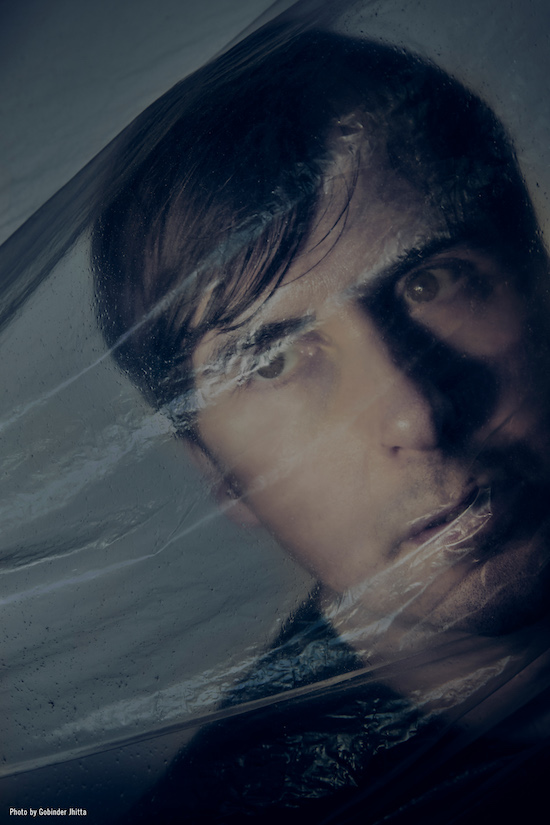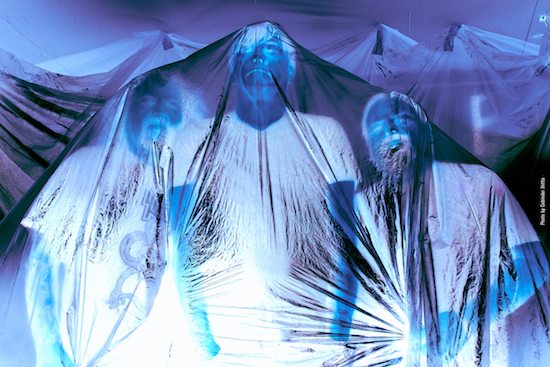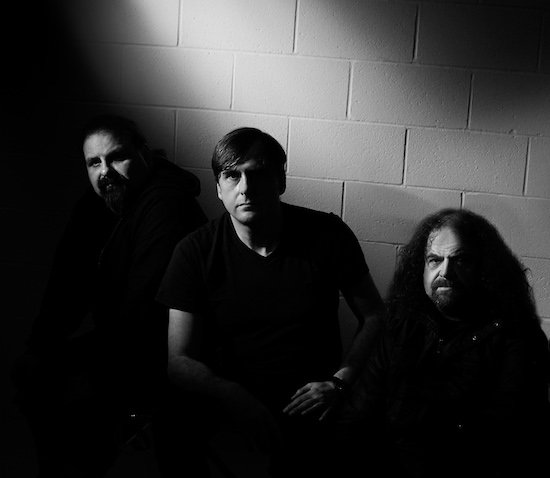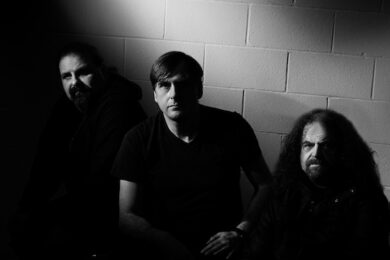Napalm Death’s latest album offers a welcome blast of unsettling rage at a time when there are no shortage of things to be unsettled by. For the sixteenth album from a band in their fourth decade, what’s striking about Throes Of Joy In The Jaws Of Defeatism is not just that they’ve lost none of their brutality, but also how they have continued to innovate. The Quietus review of the album identified shades of Killing Joke, Swans, Big Black and much more. While grindcore and the old micro-songs like ‘You Suffer’ cast a long shadow over their work, Napalm Death in 2020 are about so much more than that.
Still, in terms of their overall ‘mission’, the band cleave to the overt politics of hardcore punk more than the denial of politics that pervades metal culture, or the solipsism of the avant-garde. The press release for Throes Of Joy In The Jaws Of Defeatism couldn’t be clearer:
"The theme is basically the other – the treatment of the other, the perception of the other and the reaction to the other. There are many reference points at the moment, not just the Black Lives Matter movement but the general treatment of people who are Afro-Caribbean or South East Asian, the treatment of transgender people, and this fear that they can somehow cause huge trauma merely by their biological differences. It’s also about emigration and migration. The world wouldn’t be as it is in many positive ways without migration."
Yet if the concept is clearly explained, Barney Greenway’s lyrics are often gnomic and impressionistic, even if the rage that motivates them is clear. So I was keen to discuss how the impenetrability of both the music and lyrics might be in tension with communicating the band’s political commitments.
On top of that, it’s fair to say that metal culture (which, even if it isn’t the only musical world the band move in, does form the core of their support) contains deep reservoirs of both musical and political conservatism. Of course, both tendencies are increasingly subject to challenge: anti-fascist black metal is pushing back against the racism found in parts of the black metal scene, the stylistic innovations in metal since the 90s offer a reproach to bands who simply repeat generic conventions. Unfortunately, musical adventurousness can also go along with political conservatism; black metal being a case in point. So where do Napalm Death’s twin commitments – to breaking new sonic ground and to idealistic being in the world – position them within metal and other scenes?
In my interview with Barney Greenway, I was also keen to dig into another tension: How he manages to square his consistently confrontational lyrics with his legendarily avuncular personality. As I discovered, it is Barney’s intense humanism that offers hope amidst the dark territory that Napalm Death explore. And in his response to the pandemic and the lockdown, he expressed a healthy dose of phlegmatic, almost-optimism.
I’ve actually interviewed you before – 30 years ago. What I remember is that your manager was nagging you to cut my interview short and go off and be interviewed for local radio. But you refused and gave me loads of time, which I really appreciated as an 18 year old writing for an obscure fanzine.
Barney Greenway: Everyone counts. Especially when you get a young kid come along, chances are that he may feel uncomfortable enough as it is. And you’re going to dick him around? At the end of the day, he’s there because he’s interested in talking to you about your band, so do him the courtesy of actually giving him something.
So how has the pandemic and the lockdown been for you?
BG: My brother’s got the virus right now and he says it’s like being hit by hammer. I would hate to think that I could get handicapped by reduced lung capacity or something like that. But I do a lot of fitness stuff. I live a mile from the sea and I go out 6am every morning on my bike here and ride the coastline. And it keeps me on the level
I’ve always lived very simply. I’m not a ‘stuff’ person. I don’t need whatever an advertising billboard is telling me that I need to make my life more fulfilling. So with that in mind it hasn’t been that difficult for me. Of course Napalm is renowned for its gigging intensity and obviously that can’t happen. But when I realised that this was going the way it turned out, I just simplified things even more and so it’s been quite pleasant in a lot of ways. But then I do only have myself to answer for and I appreciate that there are many people have dependents or families and it’s not the same for them.
We do actually have some gigs coming up in the Czech Republic and in Italy in about a month and half. As it looks right now, from talking to other bands that have been there, everything seems to be working out, so at least we might do them. But of course, things might change between now and then.
What about the rest of the scene? You’re in the position of being as sort of beloved long-standing band. But I know that a lot of people are worried about what going to happen to venues and what it’s going to do to bands coming up.
BG: Yeah, but even the following we have doesn’t mean we are somehow immune from financial worries. Napalm is not a huge band and the challenges are the same for us as they are for a lot of people. And if one of us loses we all of us lose in the end.
I’ve always been about the universal basic income. If governments are worth anything – and I’m a cynic and somewhat of an anarcho-syndicalist – then you should make sure all the people live a with a degree of comfort. And when I say comfort, I don’t mean excess, I mean being able to survive. To me it’s is a no brainer.

I was really struck by the various references to disease in the lyrics to the new album: "Germ-free hold, fecal hate pole" on the title track, ‘Dispersal/Wipe Free/Zap the germs at leader feet’ on ‘Invigorating Clutch’; "Boil your lungs to chum" on ‘A Bellyfull of Salt and Spleen’; and you even have a song called ‘Contagion’!
BG: Which is strange, because none of it pertains to the pandemic! The album was finished January-February and we didn’t know at that point what was going to happen. So yeah, it’s mad because some of the language is quite coincidental.
I found the video for ‘A Bellyfull Of Salt And Spleen’ incredibly powerful. You have this animation of refugees on small boats interspersed with cuts to you screaming in what looks like physical pain. It’s a very striking contrast, and it seems absolutely with the zeitgeist.
BG: The animations, as you pointed out, are very powerful. In part of it you see people on holiday and they’re doing beach games around these corpses; the idea being that people are desensitised. So I felt that, for my part – bearing in mind that the video was recorded right in the middle of the height of restrictions and I had to do it on my own in a very small studio with the director and one camera guy – if I’m going to do this I’ve got to live up to that. I’m trying to feel the pain of those that go unseen. Whilst I can’t directly get inside their skin and feels what it’s like to attempt to come across the English Channel, the busiest shipping line in the world, in unseaworthy boats, I can acknowledge as a fellow human being that it should not even come to this.
When you look at the lyric sheet, they’re quite abstract. They’re not saying, ‘Hey, here’s our song about refugees.’ But on the press release, you were very clear to emphasise the sort of themes that you’re engaged with.
BG: One of the questions that comes up in interviews is, ‘Do you think Napalm Death could still be the same in terms of its ideas if you were a Belle and Sebastian-type band?’ Well, yes, it could be – music is universal, it can do whatever it wants. But we are a band that chooses to push the boundaries of sound to extremes, there’s a trade-off. I understand that the lyrics that I sing are quite unintelligible at points. So then what do you do to remedy that? Well you have a lyric sheet. And the lyrics, the lyrics are expressive and often quite abstract, so how do you counter that? Well, you speak about it, like we’re doing now. Doing interviews is a part of it too and the press. I also appreciate that there is a fair percentage of people with an interest in Napalm Death, whose first language isn’t English. So it’s doubly important that we do these interviews, we talk about stuff, and get the ideas across that way.
I was struck by the word ‘joy’ in the new album title. Where do you find hope in these times?
BG: Here’s the thing: I don’t think it’s distinctive. I think the world’s always been shit but it’s always been great as well. There’s a definite balance to these things. I always like to remind people that if you were born just over 100 years ago, you probably would have been drafted into some glorified muddy chess game. Human beings just haven’t learned what it actually means to be human beings. So it’s always been dark.
And the subject matter is refugees, marginalisation.
BG: [And] dehumanisation, separation. It’s always been around, it’s never been any different in my lifetime. The change is that we have governments now who are using those tools to solidify their power. I mean, say across the Atlantic, I’m almost loath to mention him, because it’s just too obvious, but we also have governments in Europe now that in the language they use to describe refugees they treat them like a discarded crisp packet or a piece of dogshit even. Then you have other governments treating LGBTQ+ people as though they pollute the biological makeup of the rest of the populace; that their country has ‘gay-free zones’ where homosexuality doesn’t exist. I mean, this is 1930s stuff. People might baulk at that comparison but I’m afraid that if you condition people in that way then t anything is possible. Look at Chechnya. There are people who have disappeared without trace, people have been found dead or delivered to their families in that classic Mafia way with a body bag outside someone’s house.
Do you get any kind of pushback from within the scene or when you tour from people who might like Napalm Death musically, but perhaps don’t like your politics?
BG: I have to say that, despite the way things are going at present, I haven’t had anything of note in the last 10-15 years. When we toured in the States around the early to mid 90s, every few nights it would literally erupt into a riot. I don’t want to fight with people, but I wasn’t prepared to watch people coming to gigs, who wanted to enjoy the gig as a positive experience and be fucking bullied by these people. That’s all they were – bullies. So we were finding ourselves sometimes fighting our way out of venues. This stuff has been documented before in some books, especially from the hardcore punk scene, almost in a romantic way. There’s nothing romantic about that stuff.
You’ve got to remember that – and I’m not trying to excuse it – that all music scenes, whether it’s metal, hardcore, punk or whatever, are only a microcosm of the wider world. So there is a problem with racism and so on, no question, but it’s a societal problem. I would also say on the other hand, that metal also has some very positive people, you know, who will have nothing to do with that shit actively work against it.

You get on things like Ed Miliband’s radio show and Never Mind The Buzzcocks and back in the day you were on to TFI Friday. Is there an element of frustration that sometimes you get pigeonholed as a novelty by people who know nothing about the musical world you’re living in?
BG: I don’t trouble myself over stuff like that. Not everybody can know everything about everything. The danger with getting too uptight about this is you start to get a bit elitist. That’s one of the things that always frustrated me about the hardcore punk scene I was involved in back in the day. That’s where I first discovered Napalm, way before I joined, with the Scum album and before that I was friends with the guys and used to go and see the band all the time. It was a network of friends with all the positive things that come with it. But when the band started to get a bit of attention, there were people in the scene whispering, ‘Oh the band sold out’, that old chestnut. But you’re a band with this kind of expansive music, and you have ideas that speak to the world and about the world, why wouldn’t you want those ideas to be heard?
There was that famous moment where you tried to teach Ed Miliband to growl, but I thought it was actually quite a respectful interview in the end.
BG: I’m sure you can imagine the amount of times that I’ve done radio interviews and people have been going, ‘Do the voice on air.’ The BBC contacted me before and said, ‘We might ask you to do some…’ and I said, ‘Mate, I’m not doing it, it’s so cliched, I’m not doing it. I don’t care what it is, it’s so predictable.’ In the end, they twisted my arm, I was like, ‘Oh, I’ll just do it this once.’ But when I first walked into the studio, I had a little conversation with Ed Miliband. I told him that he appeared on my trade union voting form; we were just laughing and joking. Then he told me a couple of things about Napalm Death that only somebody who had a knowledge of the band would know. I was gobsmacked. And he goes, ‘Yeah, been a fan of the band for years.’
The other politician I’ve seen you on a platform with was Richard Burgon at the World Metal Congress. Has your attitude to politicians changed a bit over the years?
With Richard, me and him kind of became friends; I talk to him semi-regularly, because our beliefs cross over a bit. I grew up on the left. My dad was a trade unionist. I had an understanding from a very early age that the world is unequal and that it shouldn’t be unequal. But then as I grew I was introduced to bands like Crass, Conflict and so on and I started to realise that if politics didn’t liberate people then it’s not worth anything. So I have that real conflict within myself. I treat politicians like anybody else. My real problem is with the system itself. There’s an argument that all of it – much like the Roman Empire – needs to collapse and that politics needs to fall in on itself and revise itself.
Which takes me back to the new album. There seem to be an element of apocalypticism; a sense that the world is on the edge. Is the only hope that things start collapsing?
Yeah, collapsing but not to the detriment of other human beings. I always look at it in terms of very simple numbers. There is a huge percent of the world that’s doesn’t have the basic stuff of humanity, you know, water, food, a dignified existence without fear of violence, oppression, or subjugation. So why is it not legitimate to say that we need to think again?
In this and other interviews you’ve done there’s seems like a strange disjuncture. You’re sociable and friendly but you’re in this brutal band that pushes to the absolute extremes and in which you push radical politics. How do the two mesh together?
I do like the artistic contradiction between the very humane lyrics and the absolutely inhumane sonics. But there doesn’t have to be a distinction between pushing ideas and trying to understand people, trying to connect with people. I love people in general, I really do. I’ll try to be the same with people involved with the far right. I don’t want to punch them in the face, I want to actually go and shake their hand and speak to them. Because punching them in the face perpetuates cycles of violence and that isn’t going to achieve anything. Crass certainly understood that; they never allied themselves with the left or the right.
Do you want to continue long into the future? It’s pretty astonishing that you’ve still got the fire after more than three decades.
Especially when you consider it’s such a fucking noisy band! But as long as there is a world out there that requires exposure and critique, then I’m in as long as Shane [Embury – Napalm Death bassist] can write such interesting, confrontational music. One of the things that has always disappointed me about music is when bands have been around for so develop this natural conservatism that drags them downwards. I’m not interested in doing anything that reduces the impact of Napalm Death. No way. Not ever.
Throes Of Joy In The Jaws Of Defeatism is out now via Century Media. Keith Kahn-Harris’ Strange Hate: Antisemitism, Racism and the Limits of Diversity is out now on Repeater



